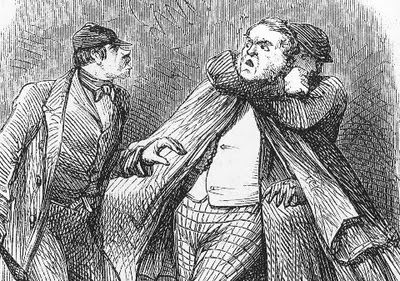Victims Program Needs Major Overhaul
By RICHARD TRAINOR
The California State Victims of Crime Program (VCP) is a neat little boutique agency designed to assist crime victims. It’s officially known as the Victims Compensation and Government Claims Board, or colloquially as the CalVCP.
Formed in 1965, CalVCP is the oldest such crime victims program in the nation. It serves more than 50,000 crime victims per year and has an annual budget of more than $100 million. The program has a state-federal funding mix, getting 55 cents in federal money out of every dollar it spends.
So far, CalVCP has provided over $2 billion in compensation to crime victims. Its new Executive Director, Julie Nauman, crowed about it when the $2 billion milestone was reached:
This is a significant moment for CalVCP and calls attention to the thousands of victims whose lives were permanently altered by violence and had nowhere else to turn. Besides paying for the expenditures associated with crime, which often leaves families financially devastated, our program plays an important role in the healing process, allowing many victims to pick up the pieces and move on with their lives in some shape or form. [Note: the CalVCP link for this quote recently was taken down by CalVCP. It formerly was here.]
In some shape or form, though, sometimes not good ones.
The CalVCP program has routinely been the subject of remedial legislation, and has been investigated by the Little Hoover Commission and by the State Auditor General’s office in 2005. The program has sometimes taken three years to discharge an approved claim.
When a victim of a crime is treated for his or her injuries by a doctor, a hospital or an emergency technician, the victim is supposed to be provided with a handout on the Victims of Crime program and told how to apply for it. The application must be completed within a year and the total amount that a victim can be compensated is $55,000.
The program is supposed to provide free in-house advocates to aid the victim so he or she can avoid hiring an attorney to press their case. If a claim is approved, the victim is notified within 90 days and can then collect their checks.
But often, crime victims are left to twist in the wind on their own and provide their own legal, medical and rehabilitation services, at their own cost.
Administrative costs add up
Michael Siegel, a Loomis-based attorney, is often hired by crime victims when the approval of their claims is in danger. About CalVCP, Siegel said, “They’re worse than ever. They’ve cut back on service payment amounts for doctors and counselors, for lawyers and for the victims themselves.”
Siegel puts the CalVCP’s administrative costs figure at 40 percent. CalVCP media spokesman Jon M. Myers disputed that. Myers said, “That’s an exaggeration; it’s closer to 20 to 25 percent.”
Siegel disputed Myers’ figures, saying, “They’re passing along some of their overhead to other uses, but it’s still money that should go to the victims.”
One client of Siegel’s is a woman named Krista Clem-O’Sullivan. Her story is tragic. Her husband, John “Scully” O’Sullivan, was murdered in August 2009 on their ranch in El Dorado County. Reported the Oct. 11, 2010 Irish Central:
Ken Zimmerman is on trial in Amador Superior Court in northern California accused of the murder of Irish man John O’Sullivan.
In August of last year, fourteen months ago, John O’Sullivan was found dead in his tractor with shotgun wounds in his back. His neighbour Ken Zimmerman, with whom he had recently had an argument, was arrested and charged with homicide.
According to evidence heard at the trial, O’Sullivan had rammed through Zimmerman’s locked gate and assaulted him before the fatal shooting.
O’Sullivan’s wife, Krista Clem-O’Sullivan, has alleged intimidation of her and her family during the course of the trial.
According to the Oct. 28, 2010 Amador News, a jury “found Kenneth Zimmerman guilty of second-degree murder.”
Krista Clem-O’Sullivan remembered:
We had four young children. My husband was on his tractor when he was shot in the back by the neighbor’s caretaker. This man had been harassing us for years, and he had even assaulted Scully with his truck. No matter what we did, the DA would not press charges on the man.
Eventually, we filed a federal civil rights case, against both the DA and the guy who shot my husband. After the murder, the DA kept our tractor as “evidence.” I asked that they rent one for me. They would not. After my husband was buried, I sought reimbursement for the funeral expenses from Vic Comp. They denied my claim, stating that my husband may have somehow “participated” in the crime. They said that the police report stated that my husband had run over the murderer’s foot with the tractor and slapped him. But you can file an appeal, they said, and we’ll even pay for the attorney.
So I hired Mike Siegel. We went to trial, and it was proven that it was physically impossible for my husband to have done either of those things. So my appeal to CalVCP still hasn’t been heard. I asked why the delay? They’re still relying on the police report, I was told. I said, What about the DA, and the experts, and the jury verdict of second degree murder with enhancements for an intentional act with a gun, and the 40-year (minimum) to life sentence? I am still waiting.
Foreclosed
Krista and her kids have had a hard time. Since Scully’s death, the family has witnessed foreclosures on their homes, the ranch where they all lived together in El Dorado County and the “Lighthouse” in Shelter Cove where Krista and the kids moved after her husband was killed. She is currently staying with Scully’s family in Ireland, living in a trailer.
Siegel says that the program is now further refining their torture:
Recently VOC started requiring personal information from county social workers filing VOC claims for county dependents, or they will return the claim as “incomplete.” They’re asking for birthdates and/or Social Security Numbers of the Child Protective Service workers, saying they need that information to protect the privacy of the child claimant if a CPS worker calls VOC for information on the claim.
In the past 40 years, they haven’t required this. I believe this is just one more way VOC is attempting to stall these applications or make it so onerous that DCFS agencies will stop sending in claims. Of course, this would result in longer waiting lists for the few, underpaid therapists who agree to take Medi-Cal for these kids.”
The maximum amount an attorney can be paid by the Victims of Crime Program is 10 percent of the total victim’s claim (which averages in the $2,000 range), with a ceiling set at $500. That’s now about to fall to $300.
For the past eight years, I’ve followed the VCP’s antics objectively as the state spends considerable money by staffing the program and often ripping off the program itself by snatching their state funding at the end of the fiscal year and kicking it back into the cash-strapped California state General Fund.
I also know this subjectively. After a near-fatal criminal assault on me in 1997, the Victims Compensation Board forced me to spend $40,000 in legal fees, didn’t settle my case until three years after it had been approved and made me suffer another $40,000 in out-of-pocket losses that they refused to reimburse. And this after Executive Director John Gillis, of the Victims of Crime at the U.S. Justice Department, admitted in a letter to me that “the board mishandled your claim.”
Numerous victimized victims
It would be one thing if Siegel and this reporter were the lone critics of the program, woofing at CalVCP because attorneys’ fees were being reduced, or due to this reporter’s unfortunate set of circumstances under a different board at CalVCP. But we are not.
A number of crime victims interviewed by this reporter have cried foul regarding the program. So have former CalVCP staff members this reporter interviewed — in Sacramento, Sonoma and San Francisco counties. And if the program is as great as Bauman claims, then why have there been all the remedial legislation and Little Hoover hearings? As one Little Hoover commissioner involved in those hearings told this reporter, “That program is a scandal; all they seem to do is further victimize the victims.”
That Hoover Commission member’s criticism was echoed by former San Diego Superior Court Judge Larry Stirling at an Assembly Public Safety Committee hearing this reporter attended in the summer of 2003, when three clean-up bills related to the Victims of Crime Program were being heard.
“We had a lot of problems with that program in San Diego County,” said Stirling, also a former Assemblyman who retired from the court in 2003 and is now a counsel with the law firm of Hamilton & McInnis. “It was a crying shame the way some of these crime victims were treated.”
Quintin Mecke, the communications director for Assemblyman Tom Ammiano, who heads the Assembly Public Safety Committee, the legislative body in charge of CalVCP, said he intends to have his boss “look into the matter.” Mecke said he was unaware of anything controversial regarding the CalVCP’s ongoing record.
Executive Director Nauman, whose CalVCP salary pays her $116,606 annually, is attempting to right the ship at CalVCP. “We’re aware of the problems from the past,” said Myers, the CalVCP spokesman. “But Ms. Nauman is an aggressive advocate for victims’ rights and benefits and you’ll see more positive changes ahead at CalVCP.”
Perhaps this is so. Maybe the State Auditor’s report and all the remedial legislation and threats of litigation may have moved Nauman and CalVCP toward a program more responsive to the victims themselves. (Richard Fine, the renowned class-action attorney once considered bringing suit against CalVCP until he found himself in a major case involving judicial corruption in Los Angeles.) But it will be prudent to keep a watchful eye upon them.
Attempts to reach Gov. Jerry Brown for comments on the Victims of Crime Program proved fruitless.
A new piece of remedial legislation is now under way, with Siegel leading the charge. “But we haven’t been able to find a sponsor yet,” he said.
At the very least, a new law should seek to protect the victims’ funds from further looting by the Legislature. Both Myers and Siegel said they would support that.
Related Articles
Big twist in San Diego stadium saga
A stadium task force named by San Diego Mayor Kevin Faulconer has been holding a rapid-fire series of meetings with
CA Also Should Split from Arnold
John Seiler: Maria Shriver has split from ex-Gov. Arnold Schwarzenegger because she was tired of being treated badly and lied
Prop. 36 takes a swing at three strikes
Oct. 29, 2012 By Dave Roberts If Proposition 36 passes, about 2,800 inmates who have committed multiple felonies and are




